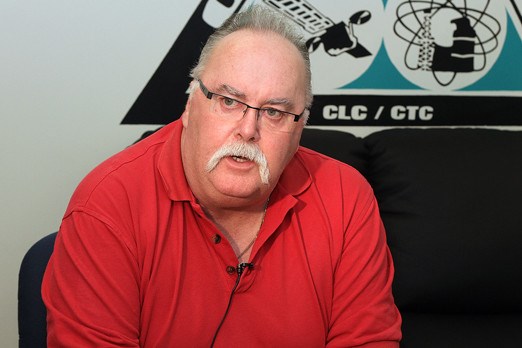A local union official has serious doubts his members will see any of the millions of dollars they’re owed in severance pay by four regional Buchanan-owned mills.
According to a document filed with the Ontario Court of Justice by the Communications Energy and Paperworkers Union locals 38 and 38.02, Northern Sawmills alone owes its employees more than $5.3 million.
The documents show Northern Sawmills also owes severance pay to 204 workers, ranging from $3,200 to $37,000.
CEP national representative Rene Lindquist estimated 600 unionized workers at the three mills he oversees are owed more than $9 million, but as unsecured creditors they’re not high on the repayment list and not likely to see much trickle their way. Their best bet, he added, with not much hope in his voice, would be a government program that would pay out the money owed, but he said he knows that's not going to happen.
“For lack of a better word, workers are going to get screwed again. And unfortunately it happens,” Lindquist said. “We’re acting on behalf of our workers at those locations. We will work with the receiver and do everything we can and find opportunities under the wage earner protection plan now that the company is bankrupt to see what money is there.
“We will also work with them for the purpose of their pension plan, under the pension plan guaranteed fund of the provincial government to ensure we find every opportunity to generate some type of a soft landing. The unfortunate thing is we would have liked to have seen jobs. That was our first priority.”
On Thursday Buchanan officials announced a Toronto court had placed Atikokan Forest Products and Thunder Bay’s Northern Sawmills into receivership.
Buchanan’s other two Thunder Bay operations, Great West Timber and Northern Hardwoods, are now under the protection of a bankruptcy trustees Grant Thornton.
Lindquist said the move comes as no surprise.
“We anticipated that (the market) would come back. It hasn’t yet and then it got to the point where after three years we’re legally bound to force the issue on the severance pay,” Lindquist said. “In doing that, we went to arbitration with the company. This is money that was owed to the people. We got a court order, the company didn’t have the money to pay it.”
According to receivership documents made public by PricewaterhouseCoopers, Atikokan Forest Products took out a $12.27 million loan with G.E. Canada Equipment Financing G.P. in 2007. The company has defaulted on its monthly $192,000 payment since last April, and as of Nov. 30, 2010, still owed more than $8.6 million on the loan.
Northern Sawmills took out a $13 million loan with G.E. Canada that same year, money which Atikokan Forest Products guaranteed under a 2009 agreement. Northern Sawmills made its last payment on March 22, 2010, and still owes $9.1 million on the loan.
The document states the appointment of a receiver is necessary to protect G.E.’s interests in the mill, which is been dormant since 2008.
The report also says that G.E. officials in September met with other debtors in Thunder Bay to discuss potential buyers for both mills and the company has asked the receiver to continue preparing a marketing plan to initiate the sales process as quickly as possible, minimizing additional costs.
“My personal opinion is it’s pretty unlikely, but it’s in receivership now and the next thing that could happen there likely is they will be bankrupt shortly, I think,” Lindquist said.
Other secured creditors who could benefit from the sale include Buchanan-owned Lucky Star, Buchanan Sales Inc. and the Royal Bank of Canada.
Lindquist said the union had little choice, forced by law to seek severance payments, which combined with G.E.’s claims, forced the Buchanan to seek protection. It became apparent, he said, that playing the waiting game was not going to bring any of the facilities back to life.
“Unfortunately it had to come to this. We’ve been working with the company for almost four years, since the layoffs originally occurred,” Lindquist said. “The bottom was falling out and there was just nothing left of the industry. It would probably cost you more to produce lumber than what it would generate to sell it.”
Sign in or register
- Messages
- Post a Listing
- Your Listings
- Your Profile
- Your Subscriptions
- Your Likes
- Your Business
- Support Local News
- Payment History
Registered Users
Already have an account?
New Users
Create a free account.
